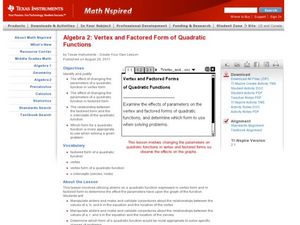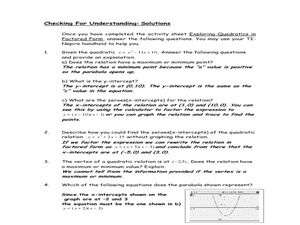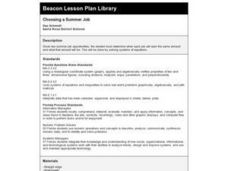Curated OER
Exploring Complex Roots
In exploring the concept of complex roots, students find the axis of symmetry and roots of parabolas. Then, they discuss what makes a solution complex and how to identify functions with complex roots.
Curated OER
Pyramid Activity
Pupils explore the concept of pyramids. They determine if two sides of a pyramid are perpendicular using a graphing calculator, then discuss parallel and perpendicular lines and how to determine if two lines are parallel or...
Curated OER
Investigating Equations of Lines
High schoolers investigate linear equations as they use technology (Cabri, Jr.) to explore the equations of lines in slope-intercept form. The technology allows learners to manipulate the line and observe the changes in the parameters of...
Curated OER
Properties of Parabolas
Learn to identify the properties of parabolas. Students define parabola as the locus of all points equidistant from a fixed point and a fixed line. Also, interpret the equation for a parabola in vertex form and gain a visual...
Curated OER
Quadratic Function Investigations
Learners perform investigation of quadratic functions while taking part in the solving of various types of problems. They explore the changes in the coefficients on the quadratic function to observe the patterns. The lesson plan includes...
Curated OER
Maximum, Minimum, Increasing, Decreasing
Learners practice with the StudyCard set on assessing real-world contexts dealing with the concepts of maximum, minimum, increasing and decreasing. They view a variety of quadratic functions and equations with their TI-83 Plus calculators.
Curated OER
Get Your Numbers in Shape - TI-83
High Schoolers use the TI-83 calculator to produce a sequence, explore patterns and find a linear or quadratic equation for a given pattern. They use inductive reasoning to make conjectures about patterns. They find the Y-value of a...
Texas Instruments
Math TODAY for TI-Navigator System - Is Leisure Time Really Shrinking?
High schoolers organize data from the USA TODAY Snapshot, "Is leisure time really shrinking?" into two scatter plots and determine the quadratic model for each scatter plot. They determine if these graphs intersect and learn the concept...
Curated OER
Math TODAY Challenge - New Color of Money
High schoolers read about the changes in the "new money" and then create a graph to represent various combinations of currency produced.
Curated OER
Vertex and Factored Form of Quadratic Functions
Learners graph quadratic equations. In this algebra lesson, students solve quadratic equations by factoring. They identify the end behavior of the graph.
Curated OER
Comparing Exponential and Power Functions
Students compare and contrast exponential and power functions. In this precalculus lesson, students identify the value of x, using the graph as a visual. They compare functions with base of greater than one, to base of less than one.
Curated OER
Trains in Motion
Students compare two object as they find the distance between them. In this geometry lesson, students create an equation describing the distance of time as a function. They use the navigator to observe the distance.
Curated OER
Computing with Mathematical Formulas
Students solve problems using formulas. In this algebra lesson, students evaluate numbers using substitution. They graph their answers using a TI and discuss the outcome.
Curated OER
Graph Polynomial Functions
Pupils explore a method of checking the sum or difference of polynomials by graphing the problem and the simplified answer and comparing the graphs.
Texas Instruments
Exploring Quadratics in Factored Form
Young mathematicians explore quadratics equations in this lesson plan. They investigate the relationship between the standard form and factored form of quadratic equations. Learners then examine the relationship between the factoring...
Curated OER
Match Me Plus
Have your class investigate Piecewise functions by matching a position versus time graph to the function that describe the walk.
Texas Instruments
Golden Ratio Lab
Learners investigate the Golden Ratio in this algebra I or geometry lesson. They explore the Golden Ratio as the conduct an experiment in which they collect various measurement from their team members and find the regression equations...
Curated OER
Count the Differences
Pupils find the difference between consecutive y-values on the calculator and write an equation that fits the data. They continue finding the differences in consecutive y-values using lists on their calculator. Learners conclude as they...
Curated OER
Find Minimum and Maximum
Learners engage in a lesson about finding the values of different graphs written in the vertex form. They rewrite each quadratic equation in vertex form while graphing the equation with the visual display of a parabola that matches the...
Curated OER
The Standard Form of A Quadratic Equation
Students investigate equations that are in the standard form of a quadratic equation represented as Y=ax2+bx+c. They factor the equations into linear factors to determine the x intercepts. The graph is also used to determine the x...
Curated OER
Finding a Line of Best Fit
Pupils engage in the practice of creating a scatter plot with the data obtained from measuring different resting heart rates. The data is used to create the table that is translated into a graph. The lesson gives instructions for the use...
Curated OER
Factoring
High Schoolers engage in a study of quadratic functions and focus upon the finding of equivalence and its connection between functions. They also practice factoring using the FOIL method while manipulating the equation. The lesson also...
Curated OER
Let's Play Some Ball!
Pupils review horizontal and vertical shifts of a parabola and how they effect a specific quadratic formula. They play a basketball review game in which they try to find the right quadratic equation for a given problem in order to earn...
Curated OER
Choosing a Summer Job
What did you do over your summer vacation. Young wage earners must compare summer job options, and determine when each job earn the same amount and what that amount be. This be done by creating, graphing, and solving systems of...

























